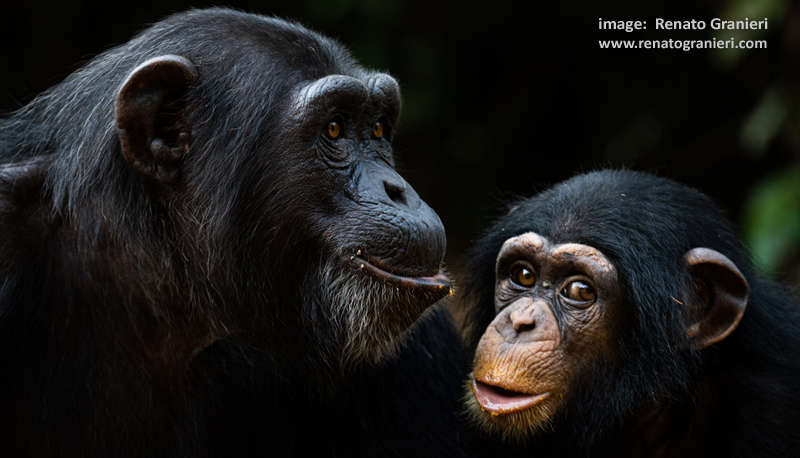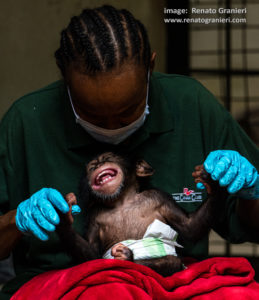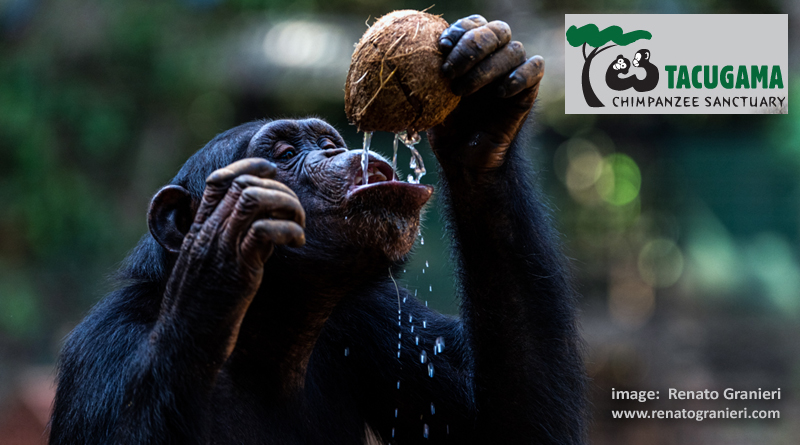TACUGAMA CHIMPANZEE SANCTUARY
This is a Q&A with Aram Kazandjian, Development Manager at Tacugama Chimpanzee Sanctuary (TCS) in Sierra Leone:
What is Tacugama?
It’s a movement really. Tacugama Chimpanzee Sanctuary (TCS) was founded in 1995 by Bala Amarasekaran, together with the Government of Sierra Leone (GoSL), which allotted 40 hectares of land to be used inside the area which is now the Western Area Peninsula National Park. As of December 2020, the sanctuary cares for 97 chimpanzees and, unfortunately, each year more orphan chimpanzees continue to arrive at TCS.
Although registered as an agency under the Wildlife Division of the Ministry of Agriculture and Forestry, TCS does not currently receive funding from GoSL. Through self-funding mechanisms, TCS perseveres to rescue and care for chimpanzees that have been orphaned due to the illegal bush-meat and pet trade or other human-wildlife conflict.
TCS also proactively seeks out and secures grants to protect the 5,500 chimpanzees living in the wild across Sierra Leone and their natural habitat. Everything TCS does starts with the chimps and transitions into wildlife conservation, research, climate change mitigation, advocacy, law enforcement, youth and women empowerment, community outreach, eco-tourism, environmental education and livelihood support initiatives. As a result, TCS has emerged as a globally recognized conservation model which provides a source of learning and inspiration for sanctuaries across Africa and worldwide.
Over the years, TCS has become an international brand by being featured in numerous documentaries including Perfect Storm (Channel 4 BBC), Mountain will Fall (Aljazeera), Chimp School (Animal Planet), Big Animal Surgery (BBC), etc., and articles in acclaimed international publications, thereby raising the awareness and funding for wildlife conservation in Sierra Leone and Africa.
What inspired the founding of Tacugama?
Bala never sought to create a chimpanzee sanctuary when he left Sri Lanka for Sierra Leone as a teenager – but when faced with the devastating consequences of wildlife poaching, deforestation and exploitation of natural resources in Sierra Leone, his conviction and determination compelled him to act.
One day, Bala and his wife, Sharmila, found a chimp called Bruno tied to a tree in Sierra Leone. Bruno needed looking after, so Bala and Sharmila rescued him. Before long, Bala and Sharmila had rescued six more chimpanzees and Tacugama Chimpanzee Sanctuary was born. Bala founded Tacugama Chimpanzee Sanctuary in 1995 and has worked tirelessly in conservation for over 25 years, through civil war and the Ebola epidemic, and without receiving a salary from Tacugama.
The adversities faced by Sierra Leone could have easily torn apart Bala’s commitment to protecting the country’s chimpanzees, and many would have given up. Armed with extraordinary passion and determination, the accountant’s vision survived the country’s ten-year civil war and Ebola outbreak, and eventually evolved into a movement that, today, engages youth and citizens across the
country to take care of their environment and wildlife.
2020 marked Tacugama’s 25th year anniversary and, Bala continues to persevere to reverse the country’s deteriorating environmental health and pioneer new projects that substantially contribute to the country’s socio-economic development and environment and wildlife conservation.

Why is a sanctuary like Tacugama needed?
As one of the least developed countries in the world, poaching, wildlife trafficking and logging represent a source of income for struggling Sierra Leoneans, thus intensifying the challenges faced by Tacugama to protect chimpanzees and their habitat.
For 25 years, Bala and the team have embraced and promoted grassroots conservation; and his conservation programme creates direct socio-economic benefits to Sierra Leone’s population through wildlife protection, law enforcement, environmental education, ecotourism, livelihood support, advocacy, research and one-health initiatives.
Tacugama currently works with 74 communities across Sierra Leone implementing conservation measures and community managed ecotourism ventures. The projects benefit the communities by facilitating strengthened land tenure governance for sustainable forest and wildlife management. Local communities also receive alternative livelihood support to improve their food security and economic viability. In return, all surrounding communities actively participate to combat deforestation.
Existing wildlife laws in Sierra Leone are widely regarded as out-of-date. The punishment for killing a critically endangered western chimpanzee can be a fine of less than a dollar. Bala is at the forefront of driving change in this area. Tacugama is working closely with the Sierra Leone National Protected Area Authority, the British High Commission, British International Security Advisory Team and the UK Sierra Leone Pro Bono Network, as well as the relevant Sierra Leonean Ministries, to help produce a series of new wildlife conservation bills that provide sufficient deterrent to stop people from hunting and trading in endangered species and keeping them as pets.
How has the shutdown of travel during Covid-19 affected your work?
The Sanctuary was closed to visitors for about eight months (March to Oct 2020), but behind the scenes TCS kept busy caring for 96 chimps. During most of that period, nearly 30 staff members volunteered to remain at the Sanctuary in lockdown, even though this meant living away from their families – so that they can look after the chimps and make sure they are safe and healthy.
Without visitor income and with rapidly increasing prices we were facing an extremely difficult stretch! As a Sanctuary we are morally obligated to look after a critically endangered species and cannot afford to take any risks, however small they are perceived to be. Otherwise, 25 years of conservation work can easily get wiped out in an instant as well as the very species we are trying to protect. Even though the Sanctuary is open again to visitors, we’re not anticipating waves of people and thus remain concerned about covering essential costs and feeding the chimps.
Our field projects have greatly suffered and some have been placed on hold. Given the pandemic’s origins, we have a duty to educate people about the links between deforestation, human/wildlife conflict and the spread of zoonotic diseases like COVID-19. We have established the first wildlife corridor reforestation project in Sierra Leone – connecting fragmented patches of forest along a 7km stretch in Moyamba district (South of Sierra Leone).
With over 60,000 trees planted (including fruit bearing trees), we have mitigated human-wildlife conflict by providing a safe passage for the chimps – one which is abundant with food thus eliminating the need for the chimps to raid farmers crops. We also work very closely with the forest edge communities to implement participatory and cooperative approaches to achieve broad-based community participation. By minimizing human/wildlife contact we are also preventing the spread of zoonotic diseases much like Covid-19.

How can we help?
These are not normal times; we anticipate the road to recovery will be a long journey. As little as a $5 contribution will go a long way to helping us to look after the very foundation of the Sanctuary – our indispensable staff and beloved chimps.
You can also support our cause by purchasing Paul Glynn’s ‘King Bruno’ (available online here). Those of you who can’t donate at this moment please circulate this appeal within your networks and connect us with organizations you feel that may support our cause.
Tacugama is one of the few sanctuaries in the world within such a close proximity to its capital. Only about a 35 mins drive from Freetown, visitors can experience Sierra Leone’s recently declared National Animal’s (the critically endangered Western Chimpanzee) natural habitat nestled in the beautiful Western Area Peninsula National Park. Tacugama conveniently is also located a short drive away (less than 1 hour) to some of West Africa’s most pristine and untouched beaches. Guests can leisurely witness the human-like behavioural traits of the chimpanzees within their forested enclosures and discover what makes them our closest living ancestors with a 98.6 % DNA match. Tacugama currently runs six eco-lodges at the sanctuary and would like to expand its eco-tourism ventures and offer other communities the opportunity to mimic its livelihood and conservation successes.
The ecotourism component is crucial for Tacugama to raise awareness about chimpanzee protection but also allows the sanctuary to become more financially sustainable. We run a number of successful regular monthly events to boost our income, including curry night, birds and breakfast, jazz nights, yoga retreats, story-telling evenings and soon keen to introduce massage and spa packages. As TripAdvisor’s #1 ranked destination in Sierra Leone, our strategy will focus mainly on developing ecotourism partnerships, capacity building and introducing new products and services to inspire guests to engage more with local conservation initiatives.
Tacugama is also working with the Ministry of Trade and Industry and the National Tourist Board of Sierra Leone to develop a programme to increase ecotourism, create jobs, conserve the environment and reduce poverty, as part of the “Sustainable Tourism Development and Promotion Project’’
What next for Tacugama?
We must continue to find a way – the communities depend on us as do Sierra Leone’s wildlife and of course the chimps.
In 2019, the Government of Sierra Leone announced that the Western Chimpanzee is the national animal of Sierra Leone and the new face of tourism, replacing the diamond. The announcements are significant because they reinforce the importance of wildlife and environment protection in Sierra Leone and put the chimpanzee at the heart of Sierra Leone’s international rebranding process. The announcement also sends a message of hope to other nations. After all, if Sierra Leone, a nation plagued by numerous catastrophic events and one of the poorest countries in the world, can secure such an important policy decision, then other nations can also undertake similar policy reform to save species from extinction.
We do have some exciting new projects that we’re hoping to announce in 2021, but there are plenty of hurdles and obstacles we need to navigate through before we get there. Our main priority for now is to strengthen our existing revenue streams, create new sources of income and make sure we have enough funds at the end of each month to cover our essential costs (roughly £10,000 – which includes staff salaries, operating/overhead costs, chimp food and supplies, etc…).
Tacugama is a movement and anyone can become part of it. Whether becoming a chimp guardian (details on our website), volunteering at the Sanctuary, contributing to the development and growth of UK based charity ‘Friends of Tacugama’, putting us in touch with your network or connecting us with new partners – there’s plenty of ways to help shape Tacugama’s future.
Where can we find out more?
You can keep in touch with Tacugama and learn more about our work through our website and via Social Media (details below).
Website: tacugama.com
Facebook: Tacugama
Instagram: @tacugama
Twitter: @tacugama
YouTube: youtube.com/Tacugama
All images are by National Geographic award-winning photographer Renato Granieri (renatogranieri.com)

